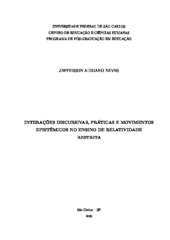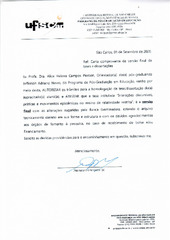| dc.contributor.author | Neves, Jefferson Adriano | |
| dc.date.accessioned | 2020-09-02T16:31:09Z | |
| dc.date.available | 2020-09-02T16:31:09Z | |
| dc.date.issued | 2020-08-10 | |
| dc.identifier.citation | NEVES, Jefferson Adriano. Interações discursivas, práticas e movimentos epistêmicos no ensino de relatividade restrita. 2020. Tese (Doutorado em Educação) – Universidade Federal de São Carlos, São Carlos, 2020. Disponível em: https://repositorio.ufscar.br/handle/ufscar/13206. | * |
| dc.identifier.uri | https://repositorio.ufscar.br/handle/ufscar/13206 | |
| dc.description.abstract | In this work, we analyze and comprehend the discursive interactions that emerge in the classroom during the realization of a teaching sequence on the concepts of space and time according to the Theory of Special Relativity, and identify the epistemic practices mobilized by students and the role of the teacher in this process, in order to answer the following research problems: Introductory classes in Theory of Special Relativity designed to encourage discursive interactions support the development of which epistemic practices? What discursive and epistemic actions of the teacher support or not the development of such practices? What discursive and epistemic actions of the teacher support or not the development of such practices? Epistemic practices are those that are socially organized, standardized and performed in an interactive way, in which the members of a community propose, justify, evaluate and legitimize knowledge. In the field of science education, several authors argue that learning science is related to learning scientific and epistemic practices. The designed sequence for this research context was performed with students who were studying in the first semester of the Physics Degree course in 2018. The investigation took place in the classroom space, with all activities recorded in audio and video, and described in the form of a field diary. The written activities that were written by the students were also part of the process. With the collected material, we organized seven teaching episodes that were transcribed and analyzed using the Argumentative Processes and Products and Practices and Epistemic Movements. In order to investigate Epistemic Practices, we proposed a set of practices specifically related to Modern and Contemporary Physics. The proposed instrument is composed of 13 practices organized in the social instances of Sense Production, Communication and Knowledge Assessment. In the analysis, we identified the student involvement in nine epistemic practices. This process had a high degree of inference and the context was essential in distinguishing between practices. Another fundamental element in carrying out the sequence was the teacher and his actions throughout the episodes, which were modified according to the problem situation or due to the pedagogical objectives. In the discursive interactions, present in the episodes, we reconstructed 17 arguments that were influenced, to a greater or lesser degree, by the teacher's actions. | eng |
| dc.description.sponsorship | Não recebi financiamento | por |
| dc.language.iso | por | por |
| dc.publisher | Universidade Federal de São Carlos | por |
| dc.rights | Attribution-NonCommercial-NoDerivs 3.0 Brazil | * |
| dc.rights.uri | http://creativecommons.org/licenses/by-nc-nd/3.0/br/ | * |
| dc.subject | Educação científica | por |
| dc.subject | Práticas epistêmicas | por |
| dc.subject | Movimentos epistêmicos | por |
| dc.subject | Argumentação | por |
| dc.subject | Física moderna e contemporânea | por |
| dc.subject | Argumento | por |
| dc.subject | Teoria da relatividade restrita | por |
| dc.subject | Ensino superior | por |
| dc.subject | Science education | eng |
| dc.subject | Epistemic practices | eng |
| dc.subject | Epistemic movements | eng |
| dc.subject | Argumentation | eng |
| dc.subject | Modern and contemporary physics | eng |
| dc.subject | Argument | eng |
| dc.subject | Theory of special relativity | eng |
| dc.subject | Academic education | eng |
| dc.title | Interações discursivas, práticas e movimentos epistêmicos no ensino de relatividade restrita | por |
| dc.title.alternative | Discursive interactions, practices and epistemic movements in the teaching of restricted relativity | eng |
| dc.type | Tese | por |
| dc.contributor.advisor1 | Pierson, Alice Helena Campos | |
| dc.contributor.advisor1Lattes | http://lattes.cnpq.br/3749421379531019 | por |
| dc.description.resumo | No presente trabalho, buscamos analisar e compreender as interações discursivas que emergem em sala de aula durante a realização de uma sequência de ensino sobre os conceitos de espaço e tempo de acordo com a Teoria da Relatividade Restrita, e identificar as práticas epistêmicas mobilizadas pelos estudantes e o papel do professor nesse processo, com o objetivo de responder aos seguintes problemas de pesquisa: Aulas de introdução a Teoria da Relatividade Restrita planejadas para fomentar interações discursivas favorecem o desenvolvimento de quais práticas epistêmicas? Quais ações discursivas e epistêmicas do professor favorecem ou não o desenvolvimento de tais práticas? Entende-se por práticas epistêmicas aquelas socialmente organizadas, padronizadas e realizadas de maneira interativa, em que membros de uma comunidade propõem, justificam, avaliam e legitimam o conhecimento. No campo da educação científica, diversos autores defendem que aprender ciências está relacionado a aprender práticas científicas e epistêmicas. A sequência planejada para o contexto desta pesquisa foi realizada com estudantes que estavam cursando em 2018 o primeiro semestre do curso de Licenciatura em Física. A investigação ocorreu no espaço da sala de aula, sendo todas as atividades gravadas em áudio e vídeo, e descritas na forma de um diário de campo. Fizeram também parte do processo as atividades escritas que foram entregues pelos alunos. Com o material coletado, organizamos sete episódios de ensino que foram transcritos e analisados por meio dos Processos e Produtos Argumentativos e das Práticas e Movimentos Epistêmicos. Para investigarmos as Práticas Epistêmicas, propusemos um conjunto de práticas relacionadas especificamente à Física Moderna e Contemporânea. O instrumento proposto é composto por 13 práticas organizadas nas instâncias sociais de Produção de Sentido, Comunicação e Avaliação de conhecimento. Na análise, identificamos o envolvimento dos estudantes em nove práticas epistêmicas. Esse processo teve alto grau de inferência e o contexto foi essencial na distinção entre as práticas. Outro elemento fundamental na realização da sequência foi o professor e suas ações ao longo dos episódios, que foram modificando-se de acordo com a situação-problema ou devido aos objetivos pedagógicos. Nas interações discursivas, presentes nos episódios, reconstruímos 17 argumentos que foram influenciados, em maior ou em menor grau, pelas ações do professor. | por |
| dc.publisher.initials | UFSCar | por |
| dc.publisher.program | Programa de Pós-Graduação em Educação - PPGE | por |
| dc.subject.cnpq | CIENCIAS HUMANAS::EDUCACAO | por |
| dc.publisher.address | Câmpus São Carlos | por |
| dc.contributor.authorlattes | http://lattes.cnpq.br/6323444324286748 | por |


